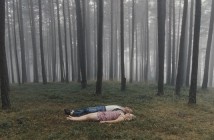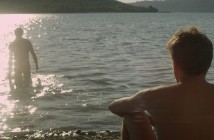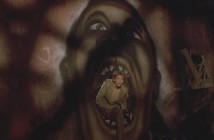
Why has this column come to count eight as the minimum number of films to be contained? I can’t tell you, in truth; perhaps, being as it is a weekly list of recommendation, eight is the ideal number to ape a baker’s dozen, as it were. Either way, it feels odd to give you only six, but wanting to bequeath you these before the year is up, and not wanting it to end with me watching near universally reviled horror remakes (Texas Chainsaw 3D and The Fog, if you dare), I must say sorry and settle for six. Given that it takes us to a grand total of 693 movies for the year—plus four seasons of television—I think it may constitute a fair compromise. Here’s to 694 or more in 2014.

Black Pond
What a weird movie is Black Pond, debut directors Tom Kingsley and Will Sharpe’s jet-black mockumentary trained on the strange circumstances that led to an ordinary British family being accused of murdering a dinner guest. The foremost influence is obviously Ben Wheatley, whose Down Terrace casts a heavy shadow over the directors’ genre-bending efforts. Would that they had his skill: everyone involved in Black Pond appears to be working toward a different end, envisioning a final film utterly unlike that imagined by the person beside them. The result is a movie that strives for tonal asynchronicity and succeeds beyond its wildest dreams, caught in a torpor of contrasting humour styles that’s the comedy equivalent of being jack of all trades, master of none. The cast, at least, is strong, chief among them Chris Langham, whose vision of the film this ought to be is the only one that seems at all appealing. AVOID IT.

Caesar Must Die
There’s an invigorating early scene in Caesar Must Die where the prison inmates whose staging of Julius Caesar the semi-documentary depicts are asked to audition, giving their personal details first in sorrow, second in anger. It’s at once funny and ferocious: here more than anywhere else, certainly more than in the redundant coda where one of the prisoners is made to declare the redemptive power of art, brothers Paolo and Vittorio Taviani hit on something truly profound. Elsewhere they stumble, managing only to give us a well-photographed am-dram production with a more interesting cast than most. There’s enough of the former to make of this a fine film, and an understandable—if not, perhaps, entirely deserving—winner at Berlin last year. The Taviani’s aesthetic truly is the star, whether surveying monochrome mundanity or the vivacious vibrancy of a life finding a new lease through art. WORTH WATCHING.

Drew: The Man Behind the Poster
If you don’t know the name Drew Struzan, as one interviewee in Erik Sharkey’s affable portrait remarks, you certainly know the work: the veteran poster artist, brought to a stardom all of his own for his work on Star Wars and Raiders of the Lost Ark, developed a style synonymous with an entire era of Hollywood movies. An interview equally standard and candid has the man himself telling his life story, studded with anecdotes and an enthusiastic sense of appreciation for all his talent has brought him. Talking heads tout his work more than he ever dares himself; from Spielberg and Lucas to Darabont and del Toro, each seems genuinely to accord at least a tad of their movies’ success to the magic Struzan’s paintings projected. Only joining him in his studio in the movie’s final moments, Sharkey could stand to show a little more of the man at work, but this is a perfectly pleasant portrait. WORTH WATCHING.

Stand Up Guys (Read our full review)
It’s fitting, given the fact that the narrative hinges on his ex-con character’s first and final night on the outside before his oldest friend must assassinate him, that Stand Up Guys feels for much of its running time like a wake for Al Pacino’s career. It’s no great exaggeration to say the Oscar-starved actor, now near impossible to recognise as that fresh-faced super-talent from The Panic in Needle Park and Scarecrow, dedicates a third of his dialogue here to discussing his penis. It’s easy to discredit Al for apparently opting for the pay check above all these days; on the evidence of this relatively low-budget offering, he’s simply lost his taste in scripts. Debut scribe Noah Haidle melds hammy sentiment with humdrum humour, feeding feeble line after feeble line to Pacino and Christopher Walken, and leaving nothing but nostalgia to carry the weight. Scarcely has a comedy seemed so terribly, terribly sad. AVOID IT.

The Guilt Trip (Read our full review)
There’s an odd dichotomy at work in the filmography of Dan Fogelman, the writer whose work is divided between kids’ movies like Cars and raunchier outings the like of Crazy Stupid Love. The Guilt Trip feels in some respect a merger of the two, combining the edgier comedy of the latter as embodied by Seth Rogen with the family-friendly nicety of Barbra Streisand. It’s a mix that might work with a stronger narrative structure; opting for the classic road movie formula, Fogelman and director Anne Fletcher tend to lose what small comic success they can find beneath a film that plays beat-by-beat as we expect it to. That’s not to say those beats aren’t pleasant: as much as it’s easy to anticipate where The Guilt Trip is headed long before it sets out, there are some nice emotional moments here, given life by a Streisand whose keen to make the movie feel better than it is. SO-SO.

You Ain’t Seen Nothin’ Yet (Read our full review)
Both ironic and not, nonagenarian helmer Alain Resnais’ latest is a superbly self-aware salute to a career that’s spanned the decades and a knowing nod to the reality that even that wild wealth of material hasn’t even begun to scratch the surface of artistic possibility. Uniting a handful of the director’s former collaborators, some of them not used since the ‘60s, You Ain’t Seen Nothin’ Yet has them play themselves at a fictional friend’s chateau, where a video recording of his play they once staged leads to a series of dramatic outbursts, and with it a wildly imaginative rumination on life and love, art and eternity. If only it were as emotionally engaging as it is intellectually: much as Resnais’ conceit might get the mind going, it’s all terribly flaccid in practice, the in-tandem acting feeling forced more often than fanciful. Still, there’s no denying that this is a movie quite unlike any other: problems and all, its title rings true. WORTH WATCHING.



